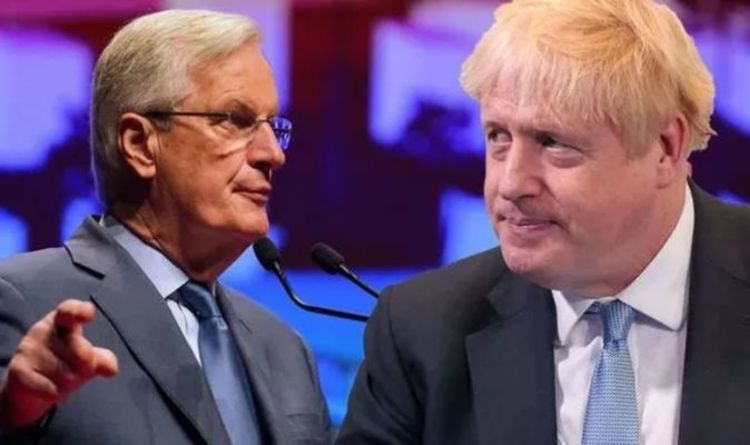Michel Barnier says Brexit could happen in other EU nations
We use your sign-up to provide content in ways you’ve consented to and to improve our understanding of you. This may include adverts from us and 3rd parties based on our understanding. You can unsubscribe at any time. More info
Mr Barnier, 70, the EU’s former chief Brexit negotiator, is now in the running to become the next President of France. After announcing his surprise bid in August, Mr Barnier has edged ahead of his rivals in the race to become the lead candidate of the centre right Republicains (LR) party. The party will hold a primary election next month to designate who will face off against President Emmanuel Macron and far-right leader Marine Le Pen at the April vote.
Mr Barnier is known to many in the UK as the head of the EU’s negotiation team, who spearheaded the talks on behalf of Brussels surrounding Britain’s exit from the bloc.
After four and a half years of fraught negotiations, Mr Johnson announced on Christmas Eve last year that both parties had finally agreed to the Trade and Cooperation Agreement.
The UK Prime Minister was heavily criticised by Mr Barnier in his book ‘My Secret Brexit Diary: A Glorious Illusion’, published in May this year.
The veteran French politician will not “placate” Mr Johnson if he becomes French President, according to Dr Paul Smith, an expert in French politics.
The academic is Associate Professor in French History and Politics at the University of Nottingham.
JUST IN: Don’t mess with Britain: EU can’t afford Brexit fight after £2tn sold to ‘Treasure Island’


He told Express.co.uk: “I wouldn’t expect Barnier to be any more placatory towards Johnson than Macron or indeed Le Pen or any of the other candidates.
“If there’s one candidate who has no real understanding or empathy towards other powers it’s Le Pen.
“I wouldn’t expect Barnier, at least at the level of rhetoric, to be any more conciliatory towards the UK than Macron has been, and I certainly wouldn’t expect Le Pen.”
Mr Barnier let rip at the UK’s negotiating team in his book, branding them “childish” and “not up to the task”.
In his 500-page telling of the Brexit talks, he described Mr Johnson as “like a bulldozer” during a period of the negotiations in 2019.

The Prime Minister “appeared to be confused about Britain’s position on key aspects of Brexit negotiations at a critical moment”, he claimed.
Mr Barnier also said the UK had wrongly claimed that the EU had ruled out a Canada-style trade deal to eliminate the majority of tariffs.
He wrote: “We looked at each other with incredulity. It was almost childish. This episode seemed to me to be quite pathetic.
“We have had many reasons over the course of the past weeks and months, in reaction to one British declaration or posture or the other, to lose our patience and dramatise the talks.
DON’T MISS:
Germany, Holland and France grit teeth as UK trade war would risk £140 BILLION [LATEST]
Boris Johnson urged not to cave in to ‘eco-warrior narrative’ over UK fishing [INSIGHT]
SNP to ‘compromise’ on removing Trident after ‘basking in glow of independence victory’ [ANALYSIS]

“But once again we mastered our nerves.”
Speaking about the incident, Mr Barnier quoted an aide as saying: “We always knew we would reach a crisis.
“Now we are here, we must do what we always said we would do and be the ‘adults in the room’.”
Dr Smith said that, while Barnier may have been critical of Mr Johnson and the UK previously, his success or failure at the French Presidential Election will be determined by domestic issues.

He said: “None of the French presidential candidates will win the election on the basis of being pleasant or unpleasant towards the British.
“The French electorate actually don’t care very much about Britain – why would they? – any more than the British electorate care about the French.
“It’s very rare that anybody wins an election on the basis of foreign policy.
“The last person who won an election on the basis of foreign policy was probably Margaret Thatcher in 1983 when she used the Falklands factor to go for an early election.”
Source: Read Full Article
